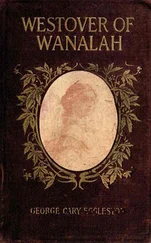He tried to reason with himself, only to find himself utterly unreasonable. Doubtless Margaret would be enjoying the air in the porch within a few days, resting and perhaps interestingly helpless still. The attentions he must lavish upon her in that case promised abundant opportunity for a tenderness of care which would open the way for his passionate declaration. At that point in his planning another and a very annoying thought obtruded itself.
"Confound it!" he muttered, "Colonel Conway is a stickler for all the conventions of our artificial social life. He will insist upon the idiotic rule that a young man mustn't address a girl in his own house or at any time when she is under his protection. What utter nonsense it is, anyhow! But I suppose I must obey it or bring down Colonel Conway's wrath upon my head. I must let all my opportunities slip away, and restrain my impulses during all the time she's here, making myself seem to her a cold-blooded brute who has taken advantage of her helplessness to force caresses upon her and then doesn't think enough of her dignity to explain himself."
Perhaps Boyd Westover's mood was playing tricks with his logical faculties. It is certain that if he had been asked at any ordinary time his opinion of the social requirement which he now scorned as an idiotic convention, he would have answered that it was eminently right and reasonable, that it was imperatively necessary indeed, for the protection of the young woman in the case against the embarrassment of having to accept hospitality or escort or favor of other kind from a man whose proffer of love she has just rejected.
But who expects an impatient lover to be reasonable—who that has ever been himself a lover? Reasonable or unreasonable, Boyd Westover felt himself bound to observe the rule that imposed so annoying a restraint upon him. He might fret and fume in revolt against it, but he must bend to the custom. He resolved to wait with what grace he could until Margaret's return to her own home. He worked out in his mind all the situations that were likely to occur during her convalescence at Wanalah, and framed all the conversations to fit the embarrassing circumstances.
Of course the situations that actually arose were totally different from those he had imagined, and the dialogues he had rehearsed proved to be as unfit for use as the text of a Greek tragedy would be on a modern comedy stage.
Colonel Conway, who happened to be in Richmond when his daughter's mishap occurred, returned at once and, after learning the details, delivered his thanks and commendations in a way that overwhelmed her rescuer with embarrassment. It was in vain that Boyd protested, disclaimed any right or title to the Colonel's extravagant eulogies of his conduct, and declared that he had done no more than any other man would have done under like circumstances. Colonel Conway would not have it so.
"You gravely imperilled your own life, sir," he replied in his peremptory way. "You went to the rescue of a damsel in distress as only a gallant knight would do, with reckless disregard of all consequences to yourself. That's what I call heroism, sir, heroism worthy of the name you bear and the proud race from which you are sprung. Now don't protest, don't contradict, don't argue, don't answer. It is only your modesty that shrinks from the recognition of your gallantry"—and so on with what Boyd felt to be "damnable iteration."
But when the old gentleman had gone back to Richmond, leaving his daughter to the care of Boyd Westover's mother, the young man reflected that the Colonel's enthusiasm would probably stand him in good stead if ever Margaret should smile upon his suit and give him leave to ask her father for her hand.
Thus in meditations sometimes hopeful and joyous, sometimes perplexed and desponding, Boyd Westover worried through the days until the glad morning came when Margaret Conway rebelled against her physician's orders and made her appearance in the porch. She was still weak enough and enough distressed by her bruises to be treated as a convalescent to whom solicitous attention was due, and of course Boyd elected himself her "gentleman in waiting."
These two, brought up on adjoining plantations, had known each other from their earliest childhood, but in later years they had seen little of each other. Boyd had been away, first at boarding-school and afterwards at the University, while the motherless girl had been slowly and awkwardly growing to womanhood, under care of her aunt and the tutelage of an accomplished governess. It was only during vacations that the two had met, and during the last two summers they had not met at all, for the reason that Margaret, with her father, had been travelling in the North and Canada and in what was then the great West during both those seasons.
It was with surprise, therefore, not unmixed with the awe of strangeness, that on his return from the University this year he had found his little playmate grown into a beautiful and very dignified womanhood. She presided now at The Oaks, her father's plantation, with all the gracious ease that enabled Virginia women of that time to make of plantation houses delightful centres of unruffled hospitality, where the coming and going of guests was in no way a matter of previous arrangement and where neither the coming nor the going created the smallest ripple in the placid self-composure of the well-ordered life of the mansion.
So great was the change in her, or so great did it seem to Boyd, that at first he hesitated and faltered over the old familiar form of address. It did not seem possible to him to call this dignified and almost stately young woman "Margaret" as he had always called the little girl that she had been. He could not address her as "Miss Conway" but he thought he might compromise on the form "Miss Margaret." The first time he addressed her in that fashion was the only time. She looked at him in dignified surprise for a moment; then with a rippling little laugh that seemed to him singularly charming, she said:
"If we have become such strangers, Boyd, that you must put a handle to my name, I'll give you all your honors and address you as 'Boyd Westover, Esq., M. A., University of Virginia.' You are to call me just 'Margaret,' please, as you've always done, if you wish to be just 'Boyd' to me."
As she spoke the words all the winsomeness he remembered in the girl came back again, but it did not dissipate the stately dignity that had grown upon her with her ripening womanhood. It was perhaps at that moment that he fell in love with her. Of that he could never be sure, but he knew now that his love for her was the one supreme passion of his life. That knowledge had come to him at the moment when he first realized her danger out there in the pasture. He recalled now the impulse that had prompted him in his half mad determination to let no obstacle stand in the way of his reaching her in time for rescue. He remembered the horror that had rended his very soul as he saw the maddened bull lift the mare and her rider and fling them from his gory horns. He knew now that he had done and dared in those maddening moments, not with the humane impulse to save an imperilled life that must come to every man with blood in his veins, but actuated by his passionate love's instinct of self-preservation.
As he ministered to her after her return to the porch, all these memories were awakened in him by a certain change that had come over her, a shyness that was not quite reserve, but yet resembled it. He was too little acquainted with the ways of women to understand this or to estimate it aright. It did not occur to him that the revelation he had made to her by his passionate caress as she lay half conscious in his arms might explain her impulse of reserve. He was too scantily versed in the impulses of womanhood to understand that after such a manifestation of his love womanly modesty must stand upon its defence until such time as he should see fit to give more formal and definite expression to his purpose.
Читать дальше












